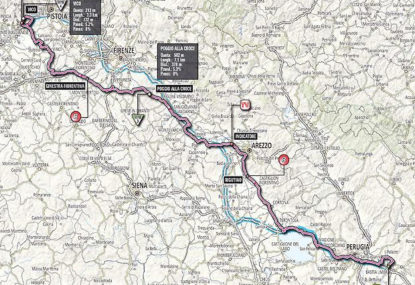'I've just won a stage of the Tour de France, mate!': Hindley grabs yellow jersey as Aussie blows Tour apart
Australia's Jai Hindley has said he is "lost for words" after a shock stage victory at the Tour de France earned him the leader's…

If you’re not a fan of descending roads on a racing bike in the rain then you’d best quit cycling as a sport.
The palaver that we saw on Tuesday was not a direct result of the riders being soft.
But the complaints that the Giro organisers have heard over the years, and indeed in this edition, played a major role in their decision to call for the neutralisation of the descent on the Stelvio.
One truism of bike racers is that they will always find something to complain about, whether it be the heat, the cold, the dryness, the wetness, the proximity of race cars, the narrowness of finishes, or the angles of curves.
Certainly no one wants to see riders hurt, and yes, some races are so poorly planned that it seems that the organisers have never raced a bike in their lives. But generally racers accept that this is a crazy sport and ultimately, you just cop it.
Why put the Stelvio in the race if you’re going to panic when it rains? Wasn’t there a contingency plan just in case? Obviously not, because you’d have to be nuts to attempt to neutralise a descent, no matter how hairy it might be.
Bike racers accept that this is a dangerous sport. Some riders are very good at getting themselves through narrow spaces in the last kilometre and, if that skill is married to fast-twitch muscle fibres, these guys tend to be top sprinters.
A guy with too much sense and a fear of crashing at 65 kilometres an hour next to metal barriers would never dream of complaining to the commissaries that the finish was dodgy. He just accepts that he isn’t good at that particular strand of bike racing and lets it go.
Going downhill is another discipline at which some excel and some do not. Simple as that. Some even relish the rain when it comes, such are their descending skills, just as Ayrton Senna loved a wet race track.
So it’s the Stelvio. It’s raining. So what?
“Really, I don’t know if what they are saying is a joke,” Nairo Quintana said the following day, after reading the complaints of some riders and team managers.
“It makes me laugh, because in reality everyone present and everyone who watches on TV knows what really happened. It’s like I went down the Stelvio in a car or on a motorbike. I came down on a bike on the same roads everyone else came down and then I climbed well afterwards.
“If I’d come down in a car, or taken a short cut and they wanted to take two minutes off me, then I’d agree with that, but I did the same route as everyone else and I won. I don’t know why they would want to take time off me.”
The important point is: “I came down on a bike on the same roads everyone else came down.”
You can argue whether the message from the organisers was conveyed properly or thoroughly, but you cannot argue with the fact that the descent is a selection point in itself, and the fact it was wet only added to its potential decisiveness.
To even consider neutralising the descent was the organisers’ first mistake.
Their second was to make such a balls-up of communicating that decision. Indeed, so unusual a call was it that its legitimacy was called into question.
Trek Factory Racing manager Luca Guercilena noted that the message itself was open to interpretation and that it was not actually justifiable within the rules of the UCI.
“The communication was wrong and liable to be misunderstood. The safety bike is not in the UCI rules,” he said.
There is of course a case to be made that it did seem that certain GC riders, Cadel Evans and Quintana among them, seemed to hang back on the descent in the belief that the descent was indeed being neutralised.
Yet Ryder Hesjedal, who came second on the stage, made a salient point when asked about what had gone on.
“Tell me what a neutralised descent is? Does everyone just stop?” he said the day after.
“If you’re serious about the race and especially if you’re in the pink jersey, you should have been at the head of affairs. End of story. Everyone rode down the descent and that was it.”
I have to say I agree with Hesjedal. These guys have ridden in enough races to learn that the best policy when you hear something on the road is to ignore it until it’s enforced by officials.
Road racers are a cutthroat bunch and not to be trusted, and that often goes for guys on your own team too. Both Evans and Rigoberto Uran should have headed straight to the front of the race to insert themselves at the head of affairs.
Had they done that, none of this would have happened.
Ultimately though, this was a problem caused by the ineptitude of the organisers. They’ve now cast a huge shadow over the result of Tuesday’s stage and it’s one that will linger over the final result of the entire race.